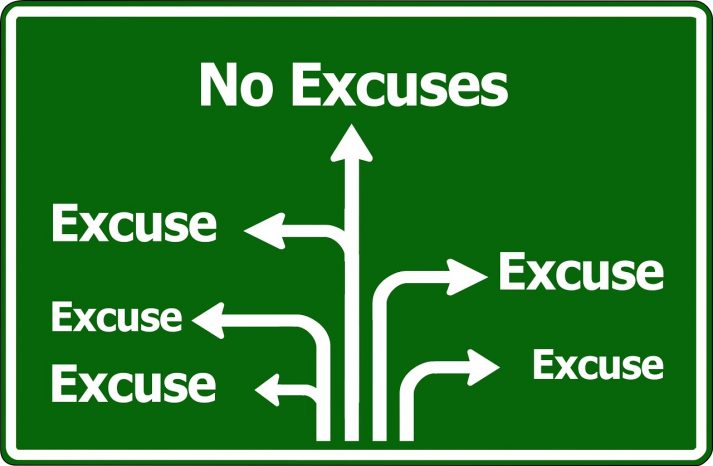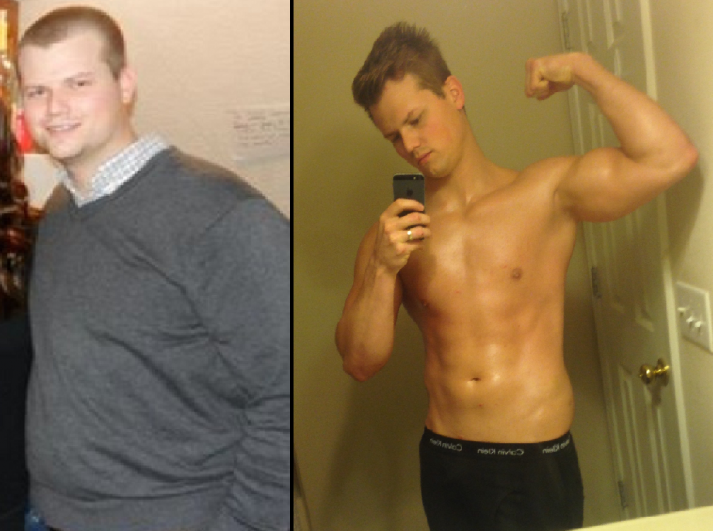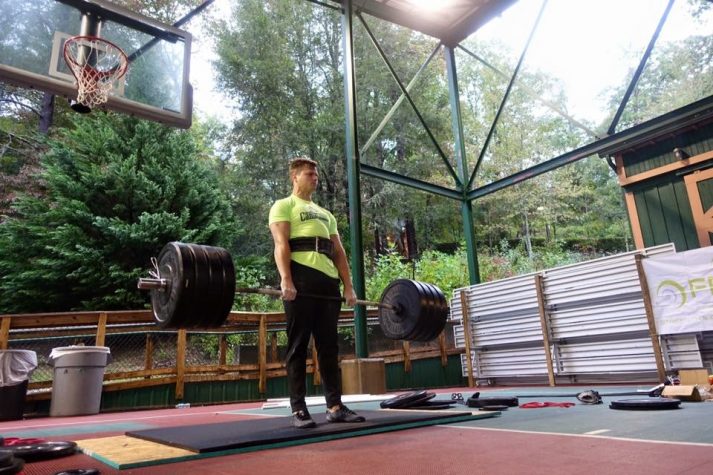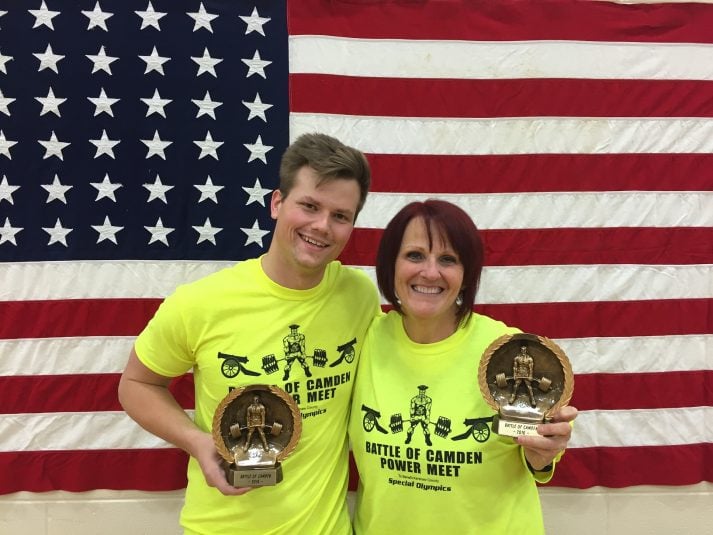This
post was originally published on
this siteOriginally posted at: http://www.nerdfitness.com/
This is a post from NF Wordsmith Taylor.
Excuses are a tricky subject. Try to point out an excuse to a friend, and you’re sure to get blasted with his or her wrath, being called an insensitive jerk:
“Easy for you to say!”
“You have NO idea what it’s like.”
“You don’t have this shit to deal with!”
On the other hand, when we can really break through and talk honestly and with some vulnerability, excuses we’ve championed for years can be pierced instantly:
“Wow, maybe I do have time, but it’s just that I haven’t made it a priority.”
“I do have some medical issues, but I’ve been using that as an excuse to do nothing all these years.”
We all play this game of life on different difficulty levels. We begin in different starting areas, with different gear, and different advantages and disadvantages. That’s just how the game works. Our job is to make the most of the hand we’ve been dealt. And it’s only us that can change us.
Only me that can change me. Only you that can change you.
Just take a moment to consider the implications of that: It doesn’t matter how bad you’ve had it. It doesn’t matter how busy you are or how much easier others may have it.
If you want to be healthy (or accomplish something else), it’s up to you to find a path to get there. It might be slow. It might take some trial and error. But nobody can do it for you. One day YOU have to decide: “I am going to do this.”
Stop Lying and Grow

Finally putting an excuse to rest can be indescribably hard; these self-limiting ideas can be shapeshifters, holding many forms. That’s because when you really believe something, it can be incredibly painful drop the excuse.
A few weeks ago we destroyed the “I’m too old” excuse. If you’ve been holding onto the belief that you are too old, finally letting go means facing the fact that you’ve wasted all that time. Your mind may even jump to imagine all the months and years that you could’ve been in shape. Now, if you were wrong and could’ve made changes ages ago, it can feel embarrassing, possibly even shameful. “How could I be that stupid?” In that moment we feel this all at once, and it’s so easy to recoil and say: “Nah, I’m right, I can’t do ___ because ___!”
That way, we don’t have to face this pain (as silly and fleeting as it is). And yeah, it’s natural to want to save yourself the pain…
But the often the ONLY way to grow and be better is to accept this reality and experience this all as it is. The story of the Phoenix reminds us that rising anew and transformed (even in the smallest of ways) requires a process that can feel a lot like death.
These self-limiting beliefs – these excuses aren’t always verbally said out loud to friends and family, or even to ourselves consciously. It’s often quiet mental chatter – an under-the-surface reason not to do something:
I’m probably too old. I’m probably too fat. I just don’t have time. I’m injured/still recovering. I’m trapped in a glass case of emotion.
In all of these cases, we’re giving up control of our situations for something that feels like it’s outside of our domain. But it’s not. We’re tricking ourselves.
Remember: Despite the absolute truth of the difficulty embedded in your excuse, the only person in the world that can do something about it is you. And there is always SOMETHING you can do to better yourself. No matter how futile the effort might seem, it is worth it.
You can change, though it might be a painful realization. Sometimes, life helps us along a little bit. Sometimes, we have to do all the work ourselves to see it. But if life does show us how we’ve been fooling ourselves, we better seize the opportunity.
That’s why I want you to hear from Kevin: a guy who’s done exactly that. Over the past few years, he’s not only managed to completely transform his body and career, but also his outlook on life along the way!
Kevin’s Story

Kevin’s journey perfectly illustrates how excuses can seem so powerful when they have a hold over us. But once they are [hulk]smashed, they are revealed for the illusions they really are!
Taylor: Kevin, thanks so much for sharing some of your story with us. I’d love to hear about the old Kevin.
Kevin: The ‘worst’ version of Kevin wakes up late for work because he stayed up into stupid hours playing Borderlands. On the way, maybe he sneaks in a cigarette that he hopes no one knows about and slugs gross amounts of Diet Coke in order to prop his eyes open. Breakfast required way too much planning, but lunch never came early enough, so Old Kevin probably walks across the street around 11am and buys the big bag of Chester’s hot fries. On the way back to his office he feels the eyes of his coworkers move back and forth between his purchase and his growing midsection. He self-consciously says something about making them last the rest of the week, but he and everyone else knows they will be gone by the end of the day.
Old Kevin drives to McDonald’s for lunch and then finishes out the work day. At home, Old Kevin goes back to Borderlands so he can forget that there aren’t many people in his phonebook that he can call. That’s not even true… Borderlands is just way easier.

Taylor: Knowing you (as a volunteer at Camp Nerd Fitness) and talking to you now, I can’t even imagine you as the Old Kevin (For those of you at home, that’s Kevin Deadlifting at Camp). Did you know things were bad?
Kevin: Yea, I started to look and feel like the worst version of myself. I gained over 20lbs in one winter. I felt like crap everyday, and began dealing with undiagnosed depression. This was early 2013.
Taylor: So, tell me about the moment of change. Was there one? How did you break through this seemingly impenetrable wall of excuses?
Kevin: My biggest excuse for not investing in my health and fitness was that I was in a place in my life where thought I needed to focus on my career. I couldn’t go to the gym because I needed to prove my value by spending more time at the office.
My first performance review shattered that excuse. I received what felt like mediocre marks, and a mediocre raise. It felt like I was getting nowhere. Pair that with the idea that I had no other options and you get a pretty uninspired Kevin who felt really, really stuck.
Taylor: Tell me more about these excuses. What did breaking through look like?
My personal brand of bullshit was pretty brilliant. I hid behind bullshit stories like “bloom where you’re planted” and “be so good they can’t ignore you,” so that I wouldn’t have to make moves and do scary things. That way I could still feel like I was building something, when I was really just hiding.
The problem was that every chapter of my life felt like another episode of Pinky and the Brain. I’d work really hard to try and take over the world only to fail miserably and be reminded that I was spending most of my time trapped in a laboratory cage. You don’t end up where you want to go by finally getting that raise, or obtaining a superhero body. You can only ditch anxiety and sleep peacefully at night when you know with certainty that you are walking your path. That path will always lead to growth.
Taylor: So, you got started with diet and exercise? What did you do exactly?
The first 3 months were extremely rocky. I hadn’t really done any studying at that point, so I was doing a lot of really stupid crap to try to lose the weight. I found it impossible to lose more than 6lbs! I even got discouraged and gave up for a while. When I got back after it, paired my gym efforts with a search for good information. Nerd Fitness and the Nerd Fitness Academy was a cornucopia of information and resources, and I gathered everything I could.
The most consistent thing about my workouts has been the strong desire to lift heavy things! I was really competitive in the weight room during high school football and I think that has stayed with me all this time. Early on I started building spreadsheets to track my workouts and systems to force progressive overload. I played with weights and reps until I found what I liked.
A workout usually looks like warming up with some body work, max effort lifting on a primary pattern, followed by accessory work that will either target a weakness or be something I’m practicing for my coaching. I’ve joined a powerlifting community that has helped me level up my Big Three (Squat, Deadlift, Bench). Thanks guys!
I’ve fallen hard for rock climbing (pun intended?) so I am also spending huge chunks of time outside somewhere awkwardly clambering up boulders.
I lost the weight eating an ultra low-carb base diet that mostly consisted of meats and veggies. I also used intermittent fasting. That said, I still can’t keep junk in my house because I have absolutely no restraint when it comes to cinnamon rolls and chocolate doughnuts.
Taylor: Well, it sounds like I wouldn’t even recognize “Old Kevin.” What have you struggled with the most on your journey?
The toughest change for me has been change itself. The dreams I have today are nothing like the dreams I had 3 years ago. I experience a lot of cognitive dissonance from day to day. On one side I am a success story, a guy who has transformed physically as well as professionally. I’ve found the success that had previously eluded me. I am building a business, and my own brand of fitness.
On the other side, I am a guy who barely made it through college with a degree I’m not using. A guy who until recently, has failed to reach many of his goals. I’ve moved away from everything I had previously worked towards, include a lifelong dream of becoming an architect. It’s the most difficult when I’m around family or friends who don’t know the new me very well.
I still get a few people who will drop in and ask me if I’ve built anything cool lately. I’ll always tell them yes, but they don’t realize I’m no longer talking about actual buildings!
It can all get very confusing. My ego doesn’t know if it should be pissed off, disappointed, or really excited about the future. I now know there really isn’t an old me or a new me. At the end of the day it’s just me, except now I’m trying to be a little better and a little truer to myself each day.
Taylor: Amen, brother! There is something profoundly difficult and imprisoning about our self-identities, especially when others feed their image of us back to us. Like you mention, people who aren’t aware of just how much you changed may talk to you as if you were a different person (an older you). Because you changed so much, in many ways you are in a very real sense, a different person now. And in another sense, it’s you – all you and only ever you.
Were there any tricks you used or a particular change that was helpful in overcoming this stuff?
Kevin: I took Steve’s advice and started to “do shit that scared me.” Not like daredevil stunts, but making moves that were scary because they were the steps I needed to take in order to move in the direction of growth.
Fear isn’t the protection mechanism that we’ve been conditioned to think it is. Its more like that game we used to play when we were kids. The one where someone goes and hides a toy in the bushes and then sends you out after it. The only information you get about your position relative to the goal is your sister giggling while saying “colder” or “hotter.”
Only your spirit knows where the goal is. Depression means “colder.” Fear means “hotter.” Fear becomes your compass. You’d be lost without it.
Taylor: Love it. We always say “do shit that scares you” – that growth happens at our limits, and that sometimes you just need 20 seconds of courage to do the things you really want to do.
So, I wanted to ask about your career change, especially now that you’re a health and fitness coach! How was making that shift? What sorts of things do you do with clients?
Kevin: I reached a point where I had so much energy towards health and fitness that doing anything other than coaching no longer made any sense!
Over the past 2 years I’ve developed a program for my athletes that focuses on healthy eating and lifestyle patterns outside of the gym. Inside the gym we develop athletic movement patterns and strength.
I am really fascinated by the concept of Mastery, so I feel like I’m currently working through my 10,000 hours of coaching. I’m always looking for ways to improve the services I am providing and ways to connect personal growth to health and fitness.
Taylor: So, I know you grew to become a Yoda to many in the Nerd Fitness Academy, and a major part of that community. What other support systems did you have?
Kevin: In the beginning I was so scared of how unhappy I was that I didn’t talk to anyone! I think I had too much pride and asking for help meant admitting failure.
However, it’s quite amazing how your support network will grow as you move in the right direction. Sometimes you will meet new friends that will more fully support your purpose. Sometimes you may be surprised when people you knew all along open up to you in new ways. Sometimes you will even be able to help them grow on their own path. It’s been exciting to see the role of NF evolve to become a part of this. I went from devouring the blog archives, to helping people on the men’s academy boards like you mentioned.
Meeting everyone at camp was a whole new level. I’m grateful to now have such cool friends from Team NF and the rest of the community. The group that gathers there each year contains some of the most earnest and supportive people I’ve ever met. I’m grateful to been a small part of it.
Get Uncomfortable, and Grow

Kevin’s story shows us how powerful our own minds and reasoning can be – often working against us. Sometimes we have to kick down the doors in our minds before we can step into the gym, or onto the pavement.
If we’re willing to listen and see, life can give us clues – hints that the stories we tell ourselves might not be 100% accurate. In Kevin’s case, that was his changing situation at work: he rose to the challenge and took a real hard look at his I’m “focusing on work excuse.”
Remember that growth isn’t easy. It happens at our limits, and it is often uncomfortable.
Each time we bust through an excuse that is ingrained in us, we make a huge step forward. In a way, we stop lying to ourselves. We start living a life that is truer to ourselves.
Are there any excuses in your life that you don’t see as excuses, but legitimate reasons for complete inaction? Is it possible there is something you can do?
Drop by and leave some questions for Kevin, or just a high five.
-Taylor
PS: Speaking of Camp Nerd Fitness, Kevin is coming back as a volunteer! Are you gonna join us this fall? We hope to see you there!









 As someone in his early sixties, I feel like I’m sometimes asked to be a spokesman for those in the “older” generations who are adamant (or even defiant) about staying smack in the center of life. I make no bones about my “live long, drop dead” philosophy (I even made
As someone in his early sixties, I feel like I’m sometimes asked to be a spokesman for those in the “older” generations who are adamant (or even defiant) about staying smack in the center of life. I make no bones about my “live long, drop dead” philosophy (I even made 









 For now classes are 6pm and 640pm at 2840 Wildwood st in the Boise Cloggers studio.
Book your class NOW!
click this ==>
For now classes are 6pm and 640pm at 2840 Wildwood st in the Boise Cloggers studio.
Book your class NOW!
click this ==>








